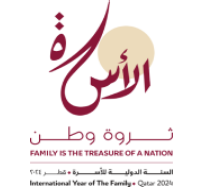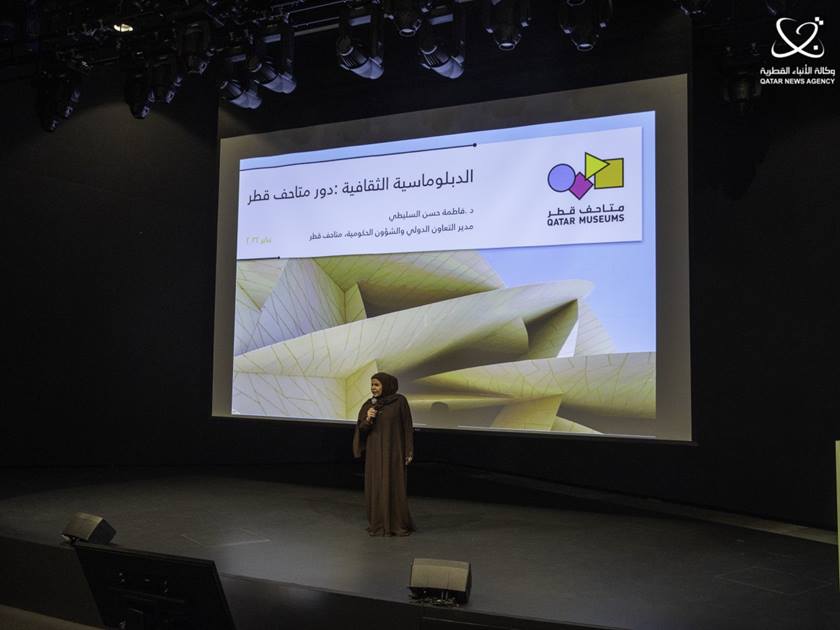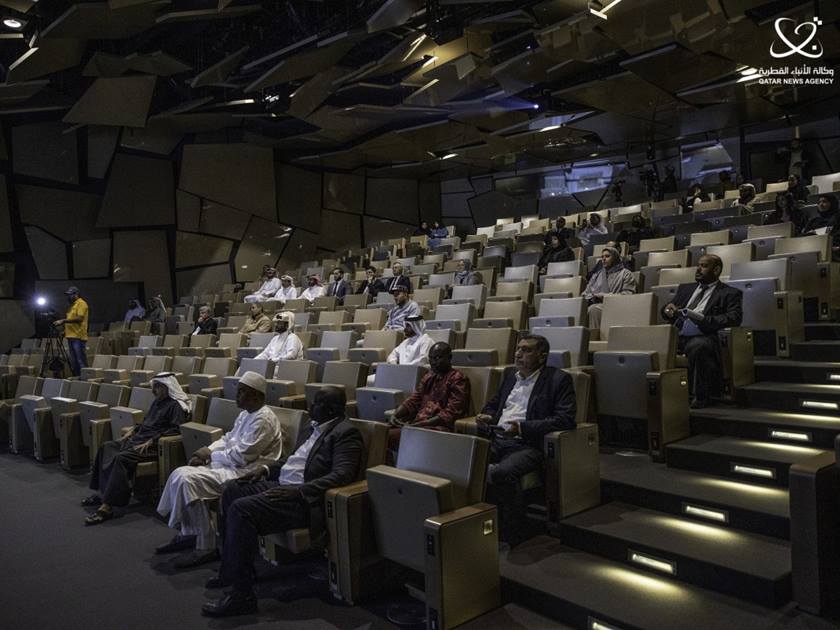Doha, January 22 (QNA) - Qatar's cultural diplomacy employed during the FIFA World Cup Qatar 2022 hosting created unprecedented direct impact on fans from worldwide, Director of the Department of International Cooperation in Qatar Museums Dr. Fatima Hassan Al Sulaiti said in a lecture on Sunday.
The lecture, held at the National Museum of Qatar (NMoQ) under the title "Cultural Diplomacy: The Role of Qatar Museums", was organized by the Katara Public Diplomacy Center (QPDC) in cooperation with Qatar Museums. It was attended by CEO of QPDC Darwish Ahmed Al Shaibani, a number of members of the diplomatic corps in the country and a host of professionals in the culture, education and media sector.
Al Sulaiti said that the Qatari cultural diplomacy introduced the fans to Qatar's ancient culture, identity and history, which will have a post-World Cup legacy.
Qatar Museums was keen to consolidate the concepts of cultural diplomacy by highlighting the importance of a growing network of museums, archaeological sites, and festivals in promoting an authentic and inspiring national cultural identity, Al Sulaiti said, noting Qatar's successful experience in protecting its heritage and cultural fabric by preserving museums and property.
The State of Qatar restored cultural and archeological sites and expanded the scope of their work and influence, as they contributed to strengthening interdependence among the countries of the world by establishing arts and culture centers, language centers, and architectural projects, she added.
Since its inception in 2005, Qatar Museums has supervised the development of a large number of museums, Al Sulaiti said.
She highlighted Qatar's embracing of many projects centered upon innovation in culture and technology, moves that intertwined cultural diplomacy with entrepreneurship to achieve long-term results. This contributed to the export of pioneering cultural products, like the widespread of spontaneous wear of the Qatari uniform during the World Cup by visitors from around the world, she said.
In line with its vision, Al Sulaiti added, the Qatar Museums continuously launches a number of artistic and creative projects and initiatives, such as the Years of Culture initiative, that celebrates the promotion of understanding and friendship among peoples.
The initiative began with Japan in 2012, and then included cultural cooperation with countries of the UK, Brazil, Turkey, China, Germany, Russia, India, France, and the US. The 2022 Year of Culture offered programming from the Middle East, North Africa and South Asia (MENASA), she said.
Al Sulaiti highlighted the agreements that Qatar sealed in a bid to enhance cultural diplomacy, most notably, the international exhibitions, and partnerships with museums in other countries, such as the Metropolitan Museum of Art.
Qatar's investment in building a strong cultural sector that preserves history, antiquities and heritage has a major role in achieving the Qatar Vision 2030, and also plays an important role in promoting cultural diplomacy and contributing to the growth of a knowledge-based society and building sustainable cities and communities, she added, pointing to the role played by Qatar's cultural institutions.
Al Shaibani hailed the cultural diplomacy as the essence and foundation of public diplomacy, ascribing the State of Qatar's success in public diplomacy to the existence of an advanced infrastructure and prestigious cultural and sports institutions, in addition to the informed public and safe environment.
Qatar's hosting of the World Cup contributed to changing the stereotyped image and correcting the misconceptions about Arabs, he said, hailing the Qatari national dress, such as the ghutra and the headband, as bright cultural symbols that reflect the authenticity of Qatari and Arab culture.
Al Shaibani also appreciated the role of cultural diplomacy in turning negative indicators into positive, constructive results, praising the vital role of official authorities and cultural and educational institutions in the State of Qatar, such as the Ministry of Culture, Qatar Museums and Qatar Foundation, in building bridges with the society and launching innovative and advanced projects in the field of public diplomacy, which enhances the status of the state and brings people together.
Earlier this month, KPDC unveiled its training plan for Qatari public diplomacy - January 2023, which includes a series of lectures and training courses, in conjunction with an awareness media campaign in collaboration with local TV outlets and social media. The campaign includes a series of interviews with a selection of Their Excellencies ministers, ambassadors, diplomats and academics. (QNA)



